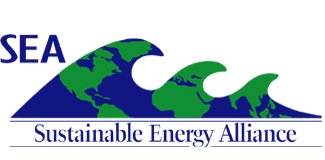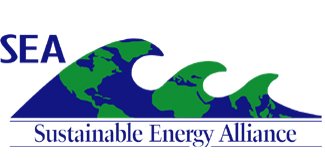
Thursday, May 31, 2007
Falmouth becomes Maine's ninth "Cool City"
A posting by John Richardson at the Portland Press Herald (click here to read the article) says that there are 7 more towns looking at signing.
Congratulations to Claudia King and others in Falmouth who helped the town take a leadership position in the fight against climate change!
The momentum is building!!!
Sunday, May 27, 2007
Companies Starting To Step Up To The Plate
It is good to see that some major corporations are starting to "get religious" about climate change. The Sea Studios website lists some organizations that are involved helping companies to make this change - and provides ways to give them positive feedback! If they know that we support what they are doing - and that we be more likely to buy their products - we can prove to business leaders that the market will respond to their efforts!
The site also has a fantastic checklist of everyday things that we all need to do to reduce out carbon footprint. Click here to see the checklist. Many of the standard suggestions, but presented in a clean, easy-to-understand way. One idea that I do not see often is:
"Turn off standby VCRs and other electronics. About 85% of your VCRs energy
consumption happens when it’s not in use. Same with your TVs and other
appliances. Buy a “Smart Power Strip” at www.smarthomeusa.com to do the work
for you."
I blogged about the Smart Power Strip in December (click here to read the blog) and highly recommend it as a way to reduce the usage of so called "phantom power."
Thursday, May 17, 2007
Union of Concerned Scientists on Nuclear Power to Fight Global Warming
The Union of Concerned Scientists website has some great information about how to stop climate change (though in my mind the goal really should be minimizing the impact of climate change...), including a position paper on the use of nuclear power. They are not against it, but feel we should start with other technologies first.
Their five conclusions are:
"1. Prudence dictates that we develop as many options to reduce global warming emissions as possible, and begin by deploying those that achieve the largest reductions most quickly and with the lowest costs and risk. Nuclear power today does not meet these criteria.
"2. Nuclear power is not the silver bullet for 'solving' the global warming problem. Many other technologies will be needed to address global warming even if a major expansion of nuclear power were to occur.
"3. A major expansion of nuclear power in the United States is not feasible in the near term. Even under an ambitious deployment scenario, new plants could not make a substantial contribution to reducing U.S. global warming emissions for at least two decades.
"4. Until long-standing problems regarding the security of nuclear plants—from accidents and acts of terrorism—are fixed, the potential of nuclear power to play a significant role in addressing global warming will be held hostage to the industry's worst performers.
5. An expansion of nuclear power under effective regulations and an appropriate level of oversight should be considered as a longer-term option if other climate-neutral means for producing electricity prove inadequate. Nuclear energy research and development (R&D) should therefore continue, with a focus on enhancing safety, security, and waste disposal."
(click here to go to the UCS website)
This seems like a reasonable response to the issue of nuclear power. There some concerns that if addressed might make it a better option, but in the meantime there are better options available for us to start with.
I am sure that we will see some sort of reemergence of the nuclear power industry in the near future. I just hope that we can find other ways to address the climate crisis.
Wednesday, May 16, 2007
Yahoo! Is At It Again
You can now create your own Green Plan To Save The Planet at the Yahoo! Green website (click here to go to the site)
There are a few things that I like about this site:
- There are A LOT of different actions that are listed. Just reading through the list gives ideas of what sorts of daily decisions can make a difference - many that I've not seen listed elsewhere.
- You can have the actions listed by lifestyle, category, effort, and impact.
- Each action has an short explanation of why it is a good thing to do and where to get more information.
- The site records your commitments and totals your carbon savings.
- The site also totals the commitments of all of the people users.
- There is a map feature to see what areas have the most people participating.
There are a couple of things that I do not see in this program:
- Any incentives. Wouldn't it be cool to make something like this a contest?
- Any accountability. There is a huge difference between PLANNING to do something and ACTUALLY DOING it.
But, anything that gives people ideas of how they can change their behavior to reduce their carbon footprint is a good thing. Check it out!
Tuesday, May 15, 2007
Recycling CFLs at Whole Foods
Monday, May 14, 2007
Is It Getting Hotter In Here?
An article last week from CNN (click here to read it) suggests that cities in the eastern US could be getting a whole lot hotter in coming decades. Former NASA scientist Barry Lynn, one of the study authors, stated "the problem is most computer models, especially when compared to their predictions of past observations, underestimate how bad global warming is. That's because they see too many rainy days, which tends to cool temperatures off, he said."
Who knows how accurate these models are versus other climate models. But, I have not yet seen any that suggest that climate change may not be as bad as predicted.
Sunday, May 13, 2007
Artic Ice Melting Faster Than Predicted
The graph below, from the NSICD website, shows how the area covered by sea ice (shown in red) is falling faster than even the standard deviation of the predictions of climate models.

The problem with melting arctic ice is that ice reflects most of the suns energy back to space. When ice is replaced by dark ocean area, the ocean absorbs more heat. This is not good news.
The biggest fear that I have is that this type of deviation from climate predictions will become increasingly apparent as time goes on. If this happens, we may already be too late to stop significant climate change. There is also the chance - as suggested in the audio clip - that we will reach a tipping point where we will suddenly be faced with significant climate changes rather than the gradual change that we all expect. This is why it is so important that we begin the transition away from carbon-based energy.
Tuesday, May 01, 2007
Use CFLs Despite the Mercury
A fact sheet at the Energy Star website compares the amount of mercury in CFLs to other household items that we are all familiar with: "older home thermometers contain 500 milligrams of mercury and many manual thermostats contain up to 3000 milligrams. " In other words, you could install CFLs in your entire house and still not have as much mercury as in the thermometers that we used to put in the mouths of our children.
As for disposal, there is one word: recycle. If you live in Kennebunk, Maine, you can bring CFLs to the Kennebunk Light and Power District offices and they can recycle them for you. Or, many towns have an annual hazardous waste collections day where CFLs can be accepted for recycling. If neither of these options are feasible, then go to the Earth911 website (http://www.earth911.org/) to find other locations. If a bulb breaks, sweep (do not vacuum) the debris, place into a plastic bag, and recycle. There is no significant risk from exposure to such a small amount of mercury.
If you choose to not recycle (and I really hope that you DO recycle your CFLs), you will still be reducing the amount of mercury emitted to the environment. The reduction in power plant emissions is estimated to be more than twice as much as the 5 milligrams of mercury that are released when a CFL is thrown in the trash.
CFLs are a cheap, easy way to reduce your carbon footprint and help to stop global warming and climate change. Though they contain mercury, their benefits far outweigh the risks that they pose.


